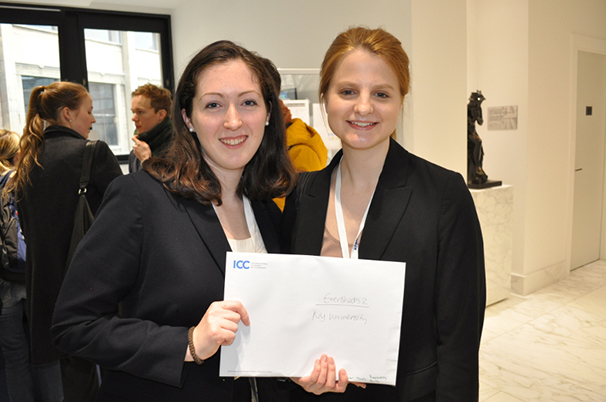
Two NYU School of Law students participated in the International Chamber of Commerce’s mediation competition in Paris for the first time in early February. The ICC International Commercial Mediation Competition takes place between two opposing teams who must develop a mediation plan and work toward an agreement while still protecting certain pre-established interests and information. Each team is made up of two individuals who act as the client and attorney in the mediation process.
Dawn Chardonnal, the communications and media relations manager for the ICC, explained the purpose of the competition.
“The competition aims to raise awareness of mediation as a dispute resolution technique that provides businesses with a procedural framework to settle matters cordially, rapidly and cost-effectively,” Chardonnal said.
Mary Grace White and Laura Wolfe were NYU’s first team to participate in the competition and on Feb. 11 they advanced to the quarterfinals.
“Ideally, mediation allows disputants to engage directly with one another to develop creative solutions and exchange information in a supportive, flexible environment conducive to repairing or preserving an ongoing business relationship,” Wolfe said.
White and Wolfe participated in the Vis International Arbitration Moot Competition in 2013, but had never participated in the ICC’s mediation competition before this year. The Vis competition involved only one problem that teams work on from October to April, while the ICC mediation competition introduced new problems for each round of the competition, White explained.
“The competition was very different from what we had experienced in the Vis Moot Competition,” White said. “We could not practice the way we usually do, by practicing the same arguments and presentation repeatedly until it is polished.”
Wolfe said the two teammates went into the competition blind.
“Much of our most effective preparation took place at the competition itself,” Wolfe said. “We were extremely fortunate that coaches of other teams, judges and practitioners serving as mediators were willing to spend time with us, either expanding on feedback given during rounds or suggesting strategies that worked well for their own teams.”
White said the competition was a challenge without the experience of their own coaches and teammates to help them, which they had during the Vis competition.
“Here, because the team was new, it was just the two of us at the competition,” White said. “We were really fortunate to have the help of Kathleen Roberts, one of our professors, in getting a basic understanding of how a mediation session works.”
Even though they are graduating this spring, Wolfe and White plan to recruit and coach a team next year. Wolfe said she hopes to get business students involved in the competition.
“Any opportunity to encourage cross-communication between the professional schools is one we ought to exploit,” Wolfe said. “We’d love to field a team of four next year, and hope our experience will serve as an advertisement to students who might be considering exploring alternative dispute resolution.”
Wolfe said she appreciates the Law school’s faculty and the availability of courses and clinics on different subjects such as mediation, arbitration and negotiation.
“But sometimes the best way to really explore an interest is through practical application in a fun, competitive environment,” Wolfe said.
A version of this article appeared in the Tuesday, Feb. 18 print edition. Ann Schmidt is a news editor. Email her at [email protected].

























































































































































